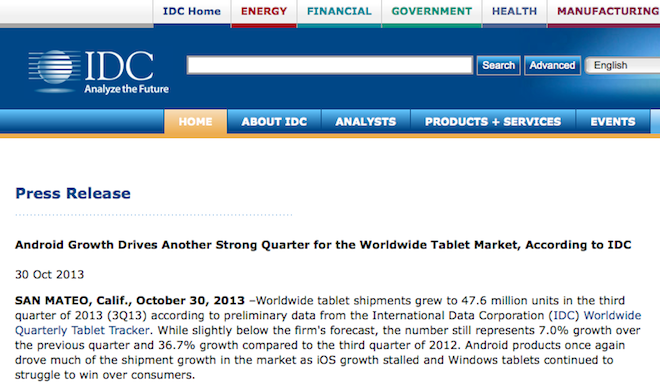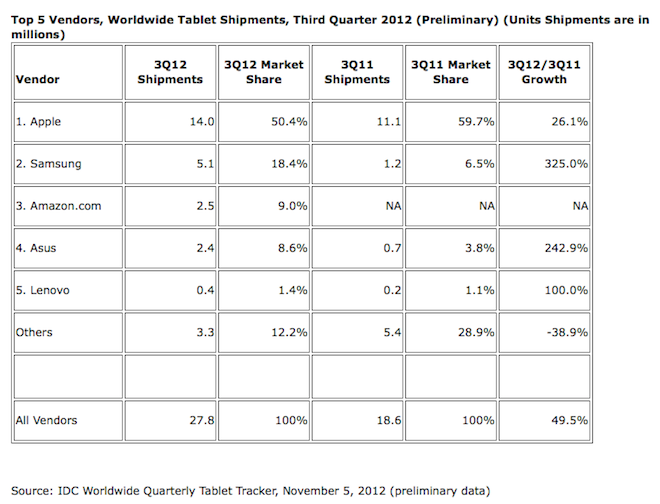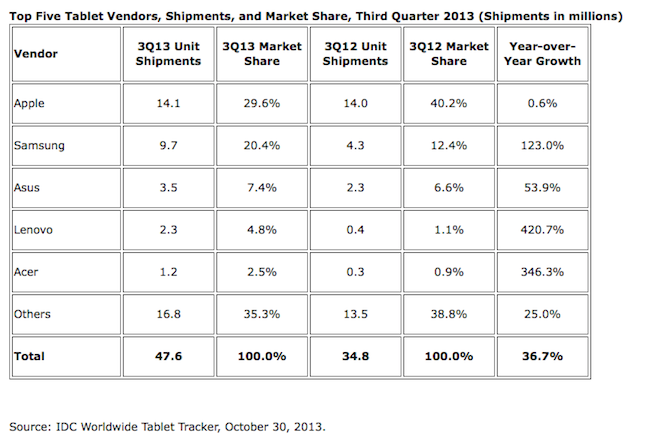More bad new for Apple's iPad "market share" numbers: IDC is now reporting that last year, there were ten million non-Apple tablets it failed to count in its original estimates, retroactively lowering Apple's share of what appears to be a really difficult market to tabulate.
In a move that sounds suspiciously similar to Strategy Analytics' invention of millions of non-iPad tablets, IDC has restated third quarter tablet shipment estimates for the year ago quarter.
The research firm not only "found" more than ten million units it could only attribute to "others," but also dramatically lowered its previously stated shipments for Samsung and Asus by more than a million devices in a single quarter.
Market share seems to have nothing to do with reality
The end result is that Apple, despite being the only tablet maker globally to ship double digit millions of devices each quarter, and by far the most profitable tablet maker in a sea of vendors, many of whom are actually losing money, is now portrayed as having had less of a "share" of the "market" than IDC previously reported.
IDC's "preliminary" shipment estimate numbers for Q3 2012 (below top) originally assigned Apple a 50.4 percent share of the market, but after the recount, the firm now says that iPads had just a 40.2 percent share of global sales last year, despite the runaway success of Apple's product that no other vendor has been able to successfully challenge.
Apple hasn't restated its sales figures or profits, so IDC's dramatically shifting "market share" numbers are based entirely on the firm's own estimates of everyone else, none of which regularly report actual sales numbers or even shipment estimates.
Apple's retroactive, overnight loss of ten percentage points of market share last year (as tabulated by IDC) appears to make the whole business of creating market share numbers for "tablet shipments" completely irrelevant to reality and wholly without any notion of accountability or legitimacy.
Samsung's secret implosion of tablet growth
Second place Samsung was originally reported by IDC to have sold 5.1 million tablets in Q3 2012, giving it an 18.4 percent share of estimated shipments (but not profits or even actual sales, and certainly not tablet usage, media sales, ecosystem support or third party developer attention).
That number also allowed IDC to report 325 percent year-over-year growth for Samsung last year. This year, Samsung's Q3 2013 tablets shipments were retroactively lowered to 4.3 million, causing its 18.4 percent share to drop to 12.4 percent.
Last year, IDC's Ryan Reith stated that Samsung "offers a wide range of tablet offerings across multiple screen sizes and colors, and that clearly resonated with more buyers this quarter. Its growth to 18.4% of worldwide market share during the quarter represents the first time a competitor has attained this level of share since the original launch of the iPad."
In light of IDC's new lower numbers however, that's no longer true. However, IDC's retroactive restating of numbers didn't also retract the favorable comments Reith, the program manager of the IDC's Mobile Device Trackers, had previously made about Samsung's tablet business.
Instead, Samsung's missing six percentage points of share from one year ago join the ten points taken from Apple, and both are applied to "other," retroactively ballooning the group of generic "white box" tablet makers from a 12.2 percent minor and shrinking segment of the market last year into a block that, according to the revised story, shipped more than one third of the market's units last year.IDC's shift in accounting turns its own market data on "other" White Box tablets upside down
IDC's shift in accounting turns its own market data on "other" White Box tablets upside down, meaning that contrary to what IDC reported last year, the "other" category was actually growing by nearly 3x rather than shrinking by 38 percent, and rather than being on par with Asus or Amazon by shipping around 3 million units, it was really nearly as large as Apple.
IDC's estimate for Samsung's Q3 2013 shipments is 9.7 million, which when contrasted to the new lower estimate from last year, turns in a spectacular growth of 123 percent. At the same time, the "rate of growth" IDC reports for Samsung is falling precipitously.
IDC made no mention of Samsung's collapsing growth rate compared to the previous year, despite the fact that both numbers were inflated by IDC's shifting figures. Instead, it just appears that Samsung's market share is growing dramatically, because its being compared to deflated new lower numbers in the past.
And now, a warning
In IDC's latest report, Tom Mainelli, the firm's Research Director of Tablets noted that "white box tablet shipments continue to constitute a fairly large percentage of the Android devices shipped into the market," more than one third, according to IDC's numbers.
However, Mainelli added, "these low cost Android-based products make tablets available to a wider market of consumers, which is good. However, many use cheap parts and non Google-approved versions of Android that can result in an unsatisfactory customer experience, limited usage, and very little engagement with the ecosystem.
"Android's growth in tablets has been stunning to watch, but shipments alone won't guarantee long-term success. For that you need a sustainable hardware business model, a healthy ecosystem for developers, and happy end users."
 Daniel Eran Dilger
Daniel Eran Dilger









-m.jpg)






 Wesley Hilliard
Wesley Hilliard
 Malcolm Owen
Malcolm Owen
 Andrew Orr
Andrew Orr
 William Gallagher
William Gallagher
 Sponsored Content
Sponsored Content
 Christine McKee
Christine McKee

 Thomas Sibilly
Thomas Sibilly







54 Comments
Pretty easy to see that Apple coasting with iOS. Zero innovation in the past 3 years. You can't even change the number of icons!
Where are they? Sitting in the bottom of a desk drawer? Or perhaps in a warehouse somewhere?
Please. Mods. Come on. Ban this… thing. Not even a person.
Originally Posted by jobsonmyface [post] Please. Mods. Come on. Ban this… thing. Not even a person. Indeed, it's probably one of the millions of Samsung's paid bloggers.
If you never reported on IDC or SA, ever again, for eternity... would any of us notice or care? [crickets]